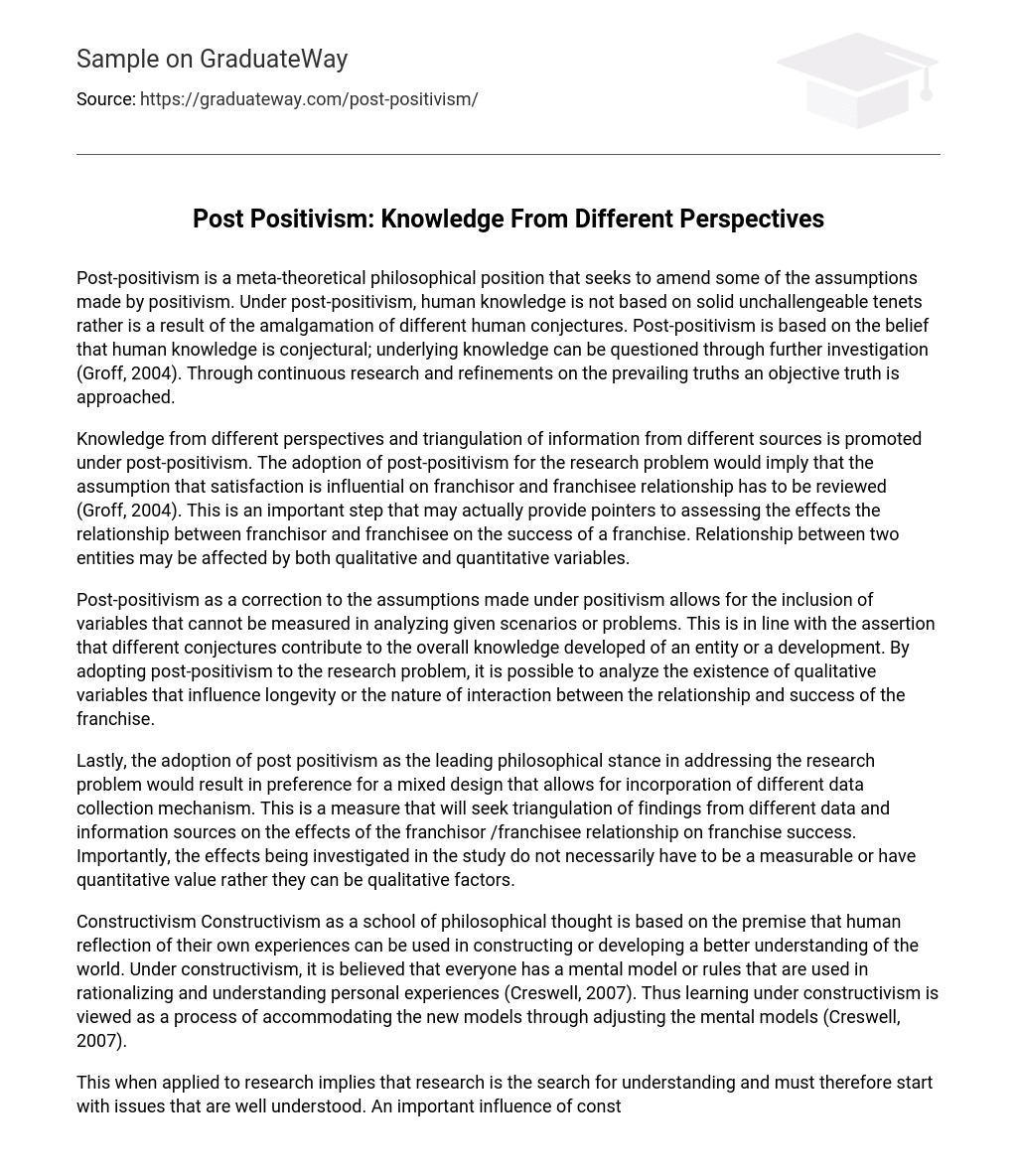Post-positivism is a philosophical position that aims to address certain assumptions made by positivism. According to this perspective, human knowledge is not grounded in indisputable principles, but rather emerges from a combination of various human speculations (Groff, 2004). Post-positivism holds that knowledge is conjectural and open to further inquiry. By constantly examining and improving existing truths, an objective truth can be approached.
Post-positivism advocates for acknowledging knowledge from diverse perspectives and gathering information from multiple sources. In the context of research, adopting post-positivism entails reconsidering the notion that satisfaction affects the bond between franchisors and franchisees (Groff, 2004). This reassessment holds importance as it can enhance our understanding of how the relationship between franchisors and franchisees influences the success of a franchise. It is worth noting that both qualitative and quantitative factors can influence this relationship.
Post-positivism serves as a correction to the assumptions made in positivism, allowing for the consideration of unmeasurable variables in the analysis of scenarios or problems. It supports the idea that various hypotheses contribute to the overall understanding of an entity or a development. By applying post-positivism to the research problem, it becomes possible to examine the presence of qualitative variables that impact the longevity or dynamics of the relationship between a franchise and its success.
To summarize, choosing post positivism as the main philosophical approach for addressing the research issue results in a preference for a mixed design. This design enables the incorporation of diverse data collection methods to combine findings from multiple sources on how the franchisor/franchisee relationship affects franchise success. It is worth noting that these effects can be either quantifiable or measurable, as well as qualitative factors.
Constructivism, a school of thought in philosophy, proposes that personal experiences can enhance human comprehension of the world. This viewpoint suggests that individuals possess mental models and guidelines for interpreting their own experiences. As a result, learning within the constructivist framework entails adjusting these mental models to integrate new information.
The concept of constructivism in research highlights the importance of seeking comprehension and recommends commencing with topics that are already comprehended. It emphasizes the significance of investigating both individual components and the broader context when analyzing a problem, thus greatly influencing research. Therefore, it is vital to identify essential ideas and refrain from prioritizing specific facts while conducting research on a particular subject.
When studying the connection between the franchise relationship and franchise success, it is important to focus on both the relationship between franchisor and franchisee, as well as the overall success of smaller segments within the franchise. To take a constructivist approach, one must analyze subproblems and broader aspects. This approach also affects data collection, as it involves transitioning from familiar information to unfamiliar territory.
A review of the existing literature and data is required in the research strategy when adopting a constructivism philosophical stance for the research problem. Advocacy/Participatory research, which focuses on social justice, is predominantly transformative. The key elements of participatory research include participation and accessing local knowledge. Many researchers believe that well-executed participatory research improves the validity of the findings by capturing the participative, relational, and social aspects of human nature (Mertens, 2005).
Advocacy research may appear one-sided and possibly biased towards supporting a specific perspective. However, involving the entities impacted or the crucial entities in the central areas of these studies enhances the credibility of the results. Advocacy aims to increase awareness of societal issues in order to influence policy decisions. These studies are grounded in the belief that theory serves as a foundation for both awareness and policy-making.
The problem statement highlights the significance of the poor performance of small and medium scale businesses in the economy and society. Adopting a participatory or advocacy research philosophy would greatly impact the methodology, as it would involve active involvement of both the franchisor and franchisee in data collection. This approach prioritizes primary data collection, which is considered less susceptible to researcher bias and more objective.
Pragmatism is primarily focused on determining the truth of a proposition or an ideology. A proposition is considered true in pragmatism if it proves satisfactory and its meaning can only be derived from the consequences of accepting it. As a result, an idea without practical implications cannot be accepted in pragmatism. Ultimately, pragmatism relies on testing the validity of ideas to ascertain their truthfulness.
The primacy of practice is a fundamental principle of pragmatism, which maintains that human ability is a vital part of intelligent practice. Accordingly, pragmatism does not regard theory and practice as distinct realms. Many pragmatists argue that the debate between theory and practice is misguided; the focus should instead be on informed practice versus uninformed practice (Creswell, 2003). Furthermore, pragmatists see theory as a conceptualization of firsthand experience that should subsequently guide experience.
The emphasis should be on determining the validity of the research strategy chosen, regardless of whether it is theoretical or practical. By adopting pragmatism, the research problem would incorporate theory. Although the problem is stated in a practical context, adopting pragmatism as the main philosophical principle would enable the inclusion of theories in comprehending and solving the problem. Additionally, this approach highlights the importance of validating the findings.
The research design and methodological strategies of a study are influenced by the adopted schools of thought. The perception of the role of research and the areas that should be given more importance are influenced by these schools of thought. Therefore, the adopted philosophical school of thought impacts the methodological strategies used to address the research problem. However, the research problem has minimal impact on the various philosophical schools of thought.





